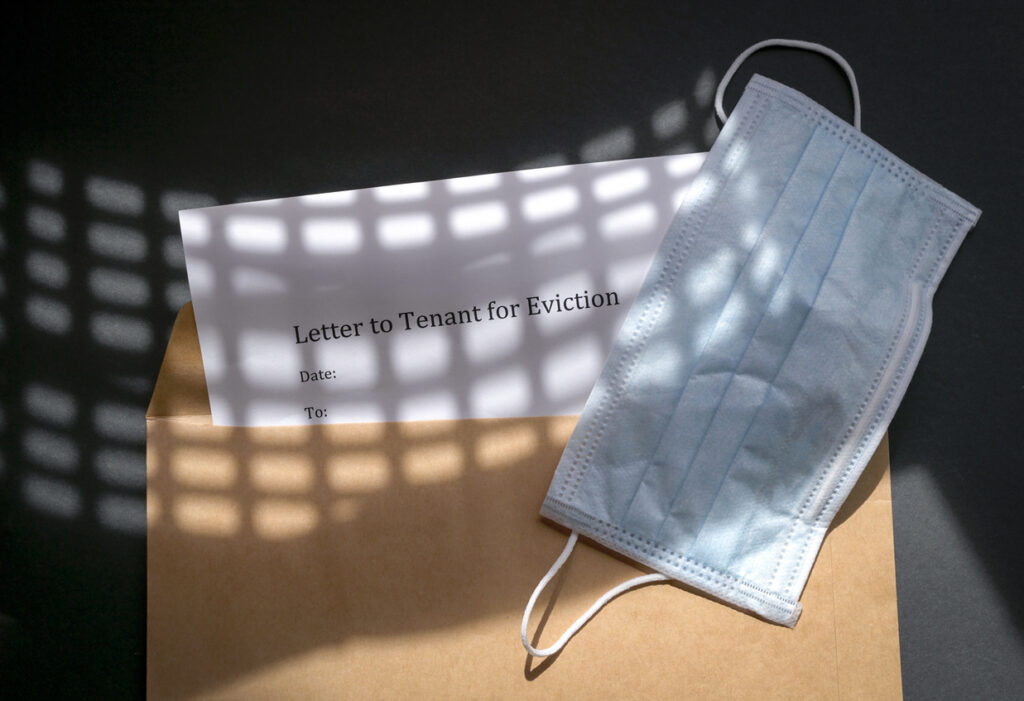
Pandemic Restrictions on Landlord-Tenant Evictions
**UPDATE MARCH 29, 2021** The eviction moratorium imposed by the CDC order set to expire March 31, 2021, has been extended through June 30, 2021.
Governments and municipalities have recognized that eviction and resulting homelessness is a public health concern, especially in the midst of a global pandemic when crowded homeless shelters pose a critical threat to residents and the community. To address this concern, the Center for Disease Control (CDC) issued an order protecting many residential tenants from eviction until at least March 31, 2021, unless further extended. The CDC Order was published in the Federal Register on September 04, 2020, giving it the force of federal law. This Order only applies to eviction for failure to pay rent and does not protect against other eviction grounds (e.g., holdover or other breaches of the lease agreement). To qualify for coverage under the Order, a tenant must be able to certify under penalty of perjury that all of the following conditions are true:
(1) The tenant has used her best efforts to obtain all available government assistance for rent or housing;
(2) The tenant either (i) expects to earn no more than $99,000 in annual income for Calendar Year 2020 (or no more than $198,000 if filing a joint tax return), (ii) was not required to report any income in 2019 to the U.S. Internal Revenue Service, or (iii) received an Economic Impact Payment (stimulus check) pursuant to Section 2201 of the CARES Act;
(3) the tenant is unable to pay the full rent or make a full housing payment due to substantial loss of household income, loss of compensable hours of work or wages, a lay-off, or extraordinary out-of-pocket medical expenses;
(4) the tenant is using her best efforts to make timely partial payments that are as close to the full payment as the tenant’s circumstances may permit, taking into account other nondiscretionary expenses; and
(5) eviction would likely render the tenant homeless—or force the tenant to move into and live in close quarters in a new congregate or shared living setting—because the tenant has no other available housing options.
A landlord wanting to proceed with eviction for nonpayment of rent must provide the tenant with a form declaration published by the CDC. This declaration outlines the above qualifications for coverage under the CDC Order. If the tenant signs and submits this declaration to either the court or the landlord directly, coverage is triggered, and eviction proceedings cannot go forward.
Landlords and Tenants in North Carolina
North Carolina courts also require the landlord or his agent to file an affidavit stating he has provided each tenant with a copy of the CDC Declaration. Note that The landlord or his agent must provide each adult tenant with their own copy. Akin to Servicemember Affidavits, an AOC form has been created for this purpose: AOC-CVM-208.
Like other similar executive orders and eviction moratoriums that have taken effect in North Carolina during the pandemic, the CDC Order only narrowly affects a landlord’s right to retake possession of the leased premises due to nonpayment of rent. It does not affect any other provisions of the lease contract. Accordingly, tenants benefiting from the CDC order still owe rent and any applicable late fees for the covered period. This means any tenant behind on rent will be vulnerable to eviction as soon as the CDC Order expires with no recourse but to fully remit payment of any unpaid rent, voluntarily move out, or work out an arrangement with their landlord. Unfortunately, it seems inevitable that this will cause a tidal wave of evictions once the moratorium expires.
This is frustrating for tenants who may find themselves in an even deeper financial hole and still facing eviction. This is also frustrating for landlords who often rely on rental income for their own support and have found themselves unable to pay their own bills due to a nonpaying tenant. Landlords have the right to seek unpaid rent from a tenant, even after that tenant has moved out, but this debt frequently goes unpaid. Some government programs such as N.C. Housing Opportunities and Prevention of Evictions (HOPE) Program have been implemented to soften the burden to all parties involved by providing rental assistance to tenants to pay their landlords. The efficacy and accessibility of these programs are unclear. The HOPE Program’s website states that as of March 1, 2021, it is no longer accepting new applications.
With the CDC’s expiration date looming, stay tuned for updates regarding federal and state orders and regulations on residential landlord-tenant law.

